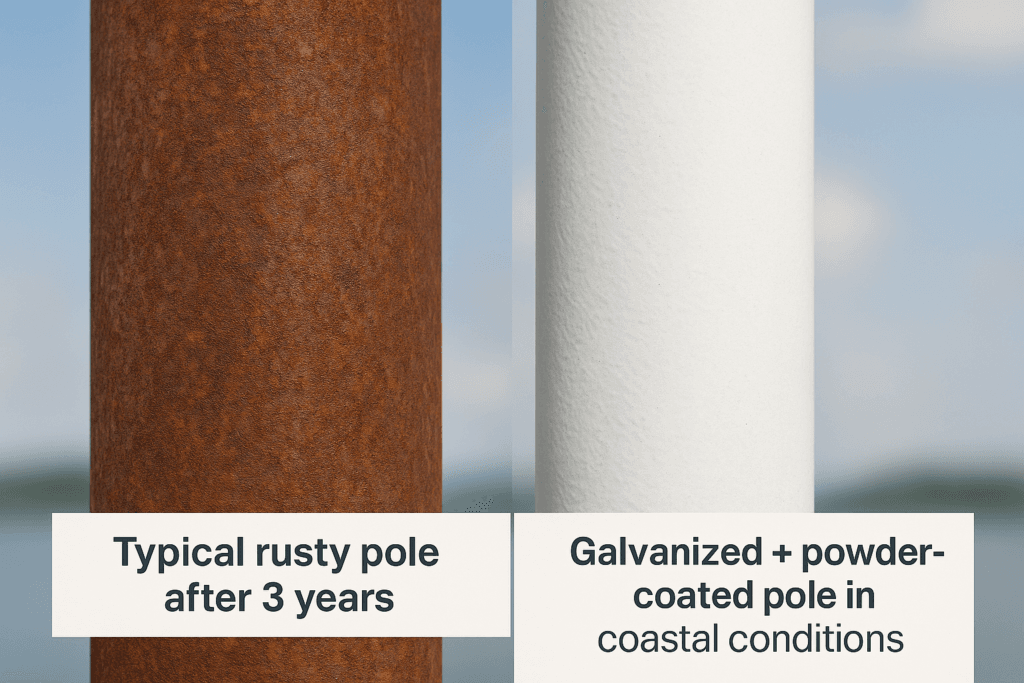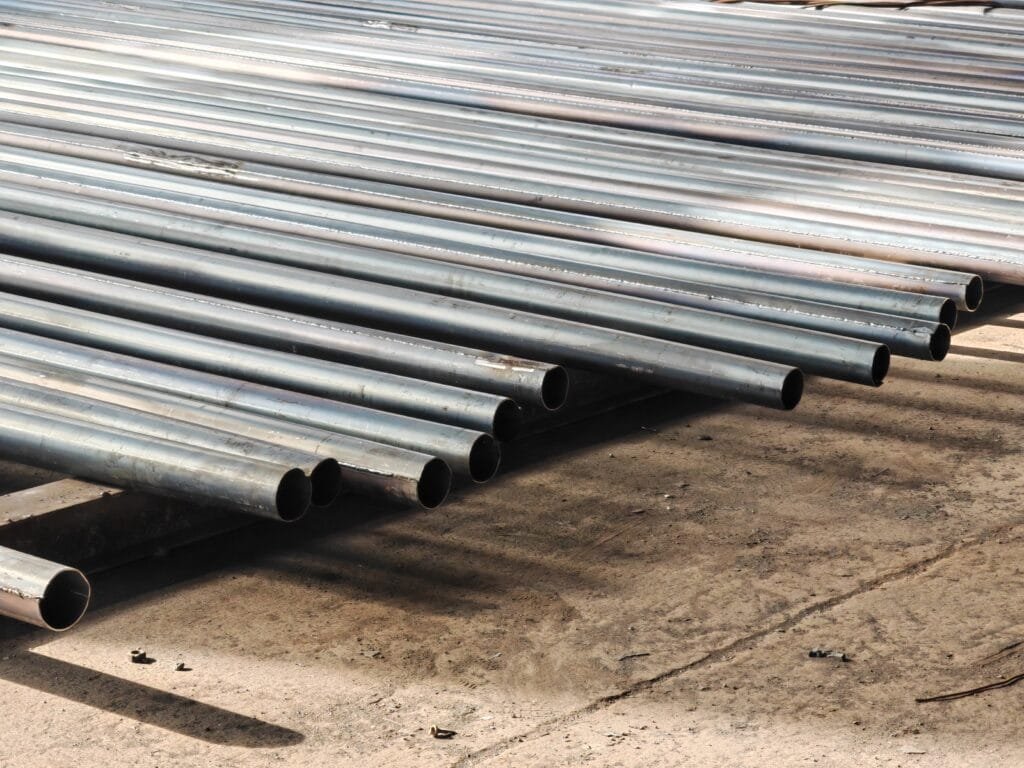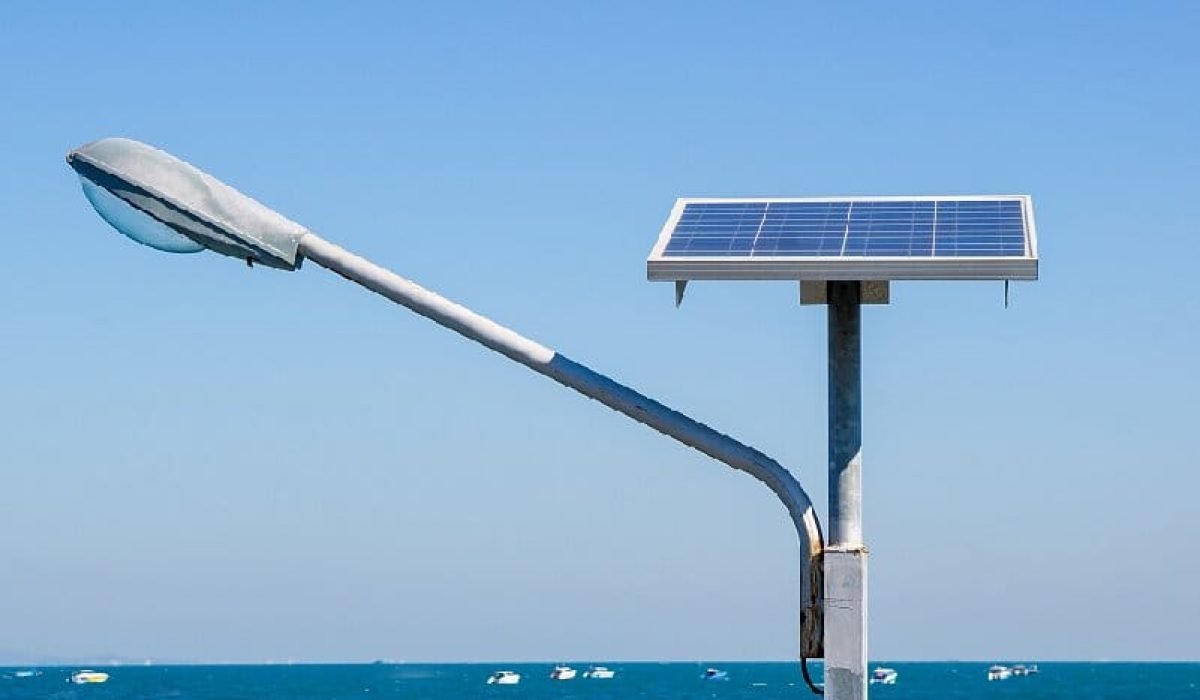If you've ever worked on a coastal lighting project, you know the struggle: salty air, constant humidity, and unpredictable winds can eat away at poles in just a few years. Choosing the right materials and coatings isn’t just a technical detail — it’s the difference between a pole lasting decades or turning into a rusted hazard in a few seasons.
🌊 Why Coastal Environments Are So Harsh on Poles
Coastal areas are one of the toughest environments for street light poles. Here's why:
- Salt spray acts like an invisible corrosive mist, accelerating rust formation up to ten times faster than inland locations.
- Persistent humidity and morning fog keep surfaces damp for longer, creating perfect conditions for corrosion.
- Strong coastal winds require poles to withstand not just corrosion but also higher structural stress.
Without proper protection, poles often require expensive repairs or full replacement after only a few years.
🛡️ Top Anti-Corrosion Methods for Coastal Street Light Poles
Based on real-world coastal projects, here are the most effective ways to protect street light poles:
1️⃣ Hot-Dip Galvanization
Hot-dip galvanized street light poles are dipped in molten zinc at around 450 °C. This creates a thick, bonded zinc-iron layer that protects even if scratched — crucial for coastal poles exposed to salt spray and airborne sand.
2️⃣ Cold Galvanizing (Zinc-Rich Paint)
Cold galvanizing, or zinc-rich spray paint, might look smooth initially but is much thinner (3–5 µm) and lacks deep penetration. In practice, these poles often require touch-ups every 1–2 years — far from ideal in marine environments.
3️⃣ Anodizing for Aluminum Poles
Aluminum poles resist corrosion naturally. When anodized, they form a strong oxide layer that shields against salty air. They’re lighter and easier to install in windy coastal areas. However, they still need proper structural engineering for storm resistance.
4️⃣ Powder Coating (Optional Topcoat)
Powder coating acts like a protective outer shell over hot-dip galvanized or anodized aluminum poles. It provides extra UV and scratch resistance while allowing for customized colors. In many coastal projects, powder coating has helped poles look brand new even after a decade.
5️⃣ Sherardizing (Thermal Diffusion Zinc Coating)
Sherardizing is mainly used for smaller components like bolts and brackets. While it offers deep zinc protection, it's not practical or economical for full-length street poles.
📸 Suggested Images

Caption: Typical rusty pole after 3 years vs. a galvanized + powder-coated pole in coastal conditions.

Caption: Three-layer defense: steel core, zinc barrier, and powder coat.

Caption: On-site installation: coastal marina project, Southeast Asia.
💡 Real Project Insight: Coastal Marina Installation
In a marina project we supported in Southeast Asia, the client previously struggled with rapidly rusting painted steel poles. They upgraded to hot-dip galvanized poles with powder coating.
Four years later:
- Zero visible corrosion, even next to seawater
- Maintenance reduced to simple inspections and occasional cleaning
- Poles still look nearly brand new, saving significant repair and replacement costs
“We haven't had a single corrosion-related callout since installing these poles four years ago,” says the maintenance director at the marina.
👨🔧 Expert Input
“Combining hot-dip galvanization with powder coating can easily push a pole's lifespan beyond 30 years, even right by the shoreline,” says Wang Ming, Technical Lead at Hitech-China. “The zinc layer offers sacrificial protection, while the powder coat maintains appearance and shields against UV and scratches.”
⚖️ Quick Comparison Table
| ✅ Process | 💪 Thickness | 🌊 Durability | 🔧 Maintenance | 💰 Cost |
|---|---|---|---|---|
| Hot-Dip Galvanizing | ≥85 µm | ⭐⭐⭐⭐ | Low (annual check) | $$–$$$ |
| Cold Galvanizing | 3–5 µm | ⭐ | High (frequent touch-ups) | $ |
| Anodized Aluminum | Varies | ⭐⭐⭐ | Moderate | $$ |
| Galv + Powder Coat | ≥85 µm + coat | ⭐⭐⭐⭐⭐ | Very low | $$$ |
* Costs vary depending on volume, location, and design requirements.
⚠️ Common Mistakes When Choosing Coastal Poles
- Relying solely on standard spray paint as a main protection layer
- Overlooking underground corrosion risks when using direct burial
- Skipping annual inspections and waiting until visible rust appears
❓ FAQ
🛡️ Material & Durability
Steel or aluminum — what's better for coastal areas?
Steel with hot-dip galvanizing offers robust sacrificial protection. Anodized aluminum works well when reducing pole weight is critical. Combining galvanizing and powder coating provides the highest level of durability and aesthetics.
🔄 Maintenance
How often should poles be checked?
At least once per year, ideally before storm or monsoon seasons. Scratches should be repaired promptly to maintain corrosion protection.
🌬️ Wind Resistance
Can these poles handle coastal storms?
Yes — provided they are properly designed and specified. Always verify EPA (Effective Projected Area) and wind load ratings. Steel poles offer more inherent stability; aluminum poles must be carefully engineered for strength.
🔧 Installation Type
Is direct burial okay for coastal steel poles?
It's possible but not recommended. Anchor-base designs make inspections and maintenance easier. If direct burial is necessary, protective sleeves should be used.
🏗️ Specification Tips
What standards should be included to ensure durability?
- Hot-dip galvanizing per ISO 1461
- Powder coating ≥ 80 µm thick
- UV-resistant outdoor-rated powder
- Salt spray resistance testing per ISO 9227
- Third-party corrosion resistance certificates (if available)
✅ Final Recommendation
In our experience, the best solution for coastal street light poles is:
Hot-dip galvanized steel poles finished with powder coating, delivering maximum corrosion resistance and an attractive finish that lasts.
Alternatively, anodized aluminum poles are an excellent choice if engineered correctly for wind and structural loads.
💬 Call to Action
🌊 Have a coastal project and want your poles to last over 30 years?
👉 Contact Hitech-China today to reduce your maintenance costs and ensure long-term durability with the right pole and coating strategy.


